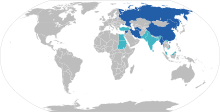Censorship of Facebook
Because the site indiscriminately displays material publicly posted by users, Facebook can, in effect, threaten oppressive governments.
Facebook can simultaneously propagate fake news, hate speech, and misinformation, thereby undermining the credibility of online platforms and social media.
As of 2024, the only countries to continually ban access to the social networking site are: China,[3] Iran,[4] North Korea,[5][6] Myanmar, Russia, Turkmenistan[7] and Uganda.
Online censorship by Facebook of algorithmic methods raises concerns including the surveillance of all instant communications and the use of machine learning systems with the potential for errors and biases.
Prime Minister Sheikh Hasina (in office from 2009) proposed the establishment of an Internet monitoring committee with the help of Bangladesh's intelligence services.
Extremists in the country had murdered eight secularists, including atheist blogger Ahmed Rajib Haider, who was fatally stabbed in February 2013.
[25] In the summer of 2016, police in fourteen German states began coordinated raids on the residences of individuals who praised the Nazi regime or referred to refugees as "scum" in a private Facebook group.
[26] A law known as NetzDG went into effect starting in 2018 which mandates all websites in Germany, including Facebook, censor such illegal content.
Koufodinas is serving a life sentence, after having been convicted as a member of the far-left Revolutionary Organization 17 November (17N), committing 11 murders in that time.
[12] India imposed a three-day ban on Facebook and other social media sites during the riots in Punjab, Haryana and Chandigarh after the conviction of Baba Ram Rahim Singh in 2017.
[35] Independent analyst showed the public doubt on Police fact statement in social media post interactions.
[36] NGO's urged government to form independent investigations to observe the issue of human-right offenses and extra judicial killing.
[39] Iranians lost unrestricted access to Facebook and Twitter the next day, leaving many people wondering whether the opening was deliberate or the result of some technical glitch.
[42] Critics of Israel's policies are not happy with this move as they claim it is being used as a way to silence outspoken Palestinian activists and journalists.
[47] In April 2016, North Korea started blocking Facebook, "a move underscoring its concern with the spread of online information," according to the Associated Press.
[5] The Information and Communication Technologies Authority (ICTA) of Mauritius, ordered internet service providers of the country to ban Facebook effective immediately, on 8 November 2007 because of a fake profile page of the Prime Minister.
The controversial page named "Draw Mohammad Day" had been created by a Facebook user in response to American cartoonist Molly Noris's protest to the decision of US television channel, Comedy Central to cancel an episode of the popular show South Park over its depiction of Muhammad.
[54] On 25 November 2017, the NetBlocks internet shutdown observatory and Digital Rights Foundation collected evidence of nationwide blocking of Facebook alongside other social media services, imposed by the government in response to the violent Tehreek-e-Labaik protests.
[55][56] The technical investigation found that all major Pakistani fixed-line and mobile service providers were affected by the restrictions, which were lifted by the PTA the next day when protests abated following the resignation of Minister for Law and Justice Zahid Hamid.
"[64] Regulatory agency Roskomnadzor announced that the restrictions had been imposed to curtail information on Facebook and Twitter which did not align with the government of Russia's positions.
[66] In November 2020, Solomon Islands' Cabinet planned to block access to Facebook in the country in response to a lack of national legislation on internet usage and cybercrime.
[72][73] On 5 May 2019, the Sri Lankan government reimposed a ban on social media platforms in an effort to stop the spread of rumours after violence erupted between groups of civilians in Negombo, north of the capital and site of one of the Easter Sunday bombings.
[citation needed] In November 2012, Tajikistan temporarily blocked access to Facebook in response to comments posted online, spreading "mud and slander" about President Emomalii Rahmon and various other officials.
Thai authorities stated if they found any illegal content in the remaining 131 posts they would ban all 14.8 million users from Facebook, instead of taking legal action.
[83] On 24 August 2020, after being pressured by Thai government, Facebook blocked access in Thailand to "Royalist Marketplace", a private Monarchy discussion group created by Pavin Chachavalpongpun that has over one million members.
[87] After photos of Mehmet Selim Kiraz being held at gun point by two terrorists began circulation on social media on 6 April 2015, the Turkish government banned Facebook, Twitter, YouTube, and 166 other websites in the country for hours.
The Uganda government blocked Facebook after the social media giant deleted hundreds of accounts of National Resistance Movement supporters it suspected to be fake during the general election last year.
The groups and pages were mostly concerned with opposition to government spending cuts, and many were used to organize demonstrations in a continuation of the 2010 United Kingdom student protests.
[96] Amongst the arrestees were a communist and socialist, and a few members of a street theater group planning an effigy beheading performance in opposition to the monarchy.
[97] A Facebook spokesperson said the pages were disabled as part of a routine sweep because they were created with fake personal profiles, a violation of the company's term of service.

